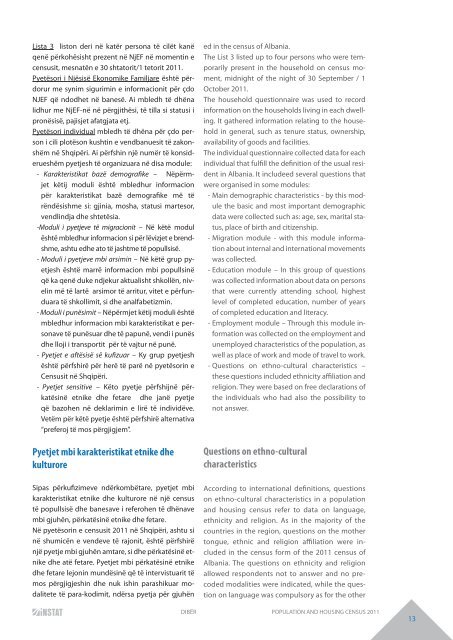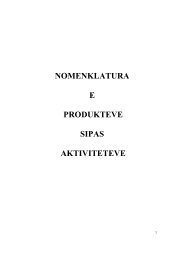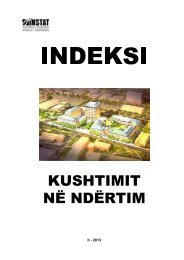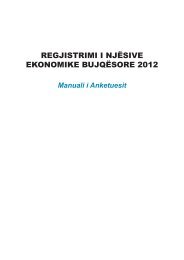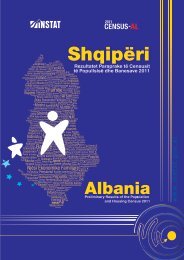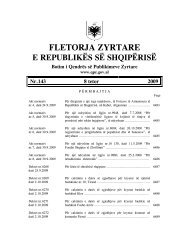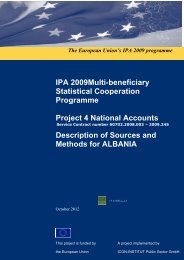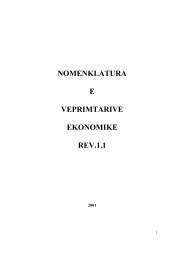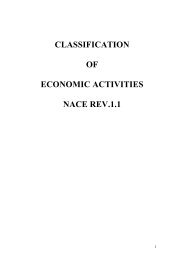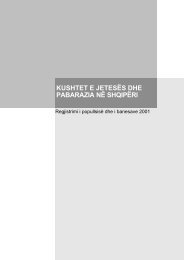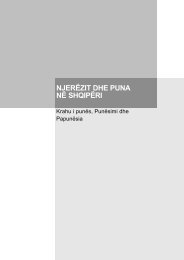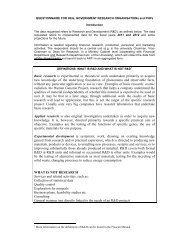DIBËR POPULATION AND HOUSING CENSUS 2011 - INSTAT
DIBËR POPULATION AND HOUSING CENSUS 2011 - INSTAT
DIBËR POPULATION AND HOUSING CENSUS 2011 - INSTAT
You also want an ePaper? Increase the reach of your titles
YUMPU automatically turns print PDFs into web optimized ePapers that Google loves.
Lista 3 liston deri në katër persona të cilët kanë<br />
qenë përkohësisht prezent në NjEF në momentin e<br />
censusit, mesnatën e 30 shtatorit/1 tetorit <strong>2011</strong>.<br />
Pyetësori i Njësisë Ekonomike Familjare është përdorur<br />
me synim sigurimin e informacionit për çdo<br />
NJEF që ndodhet në banesë. Ai mbledh të dhëna<br />
lidhur me NjEF-në në përgjithësi, të tilla si statusi i<br />
pronësisë, pajisjet afatgjata etj.<br />
Pyetësori individual mbledh të dhëna për çdo person<br />
i cili plotëson kushtin e vendbanuesit të zakonshëm<br />
në Shqipëri. Ai përfshin një numër të konsiderueshëm<br />
pyetjesh të organizuara në disa module:<br />
- Karakteristikat bazë demografike – Nëpërmjet<br />
këtij moduli është mbledhur informacion<br />
për karakteristikat bazë demografike më të<br />
rëndësishme si: gjinia, mosha, statusi martesor,<br />
vendlindja dhe shtetësia.<br />
-Moduli i pyetjeve të migracionit – Në këtë modul<br />
është mbledhur informacion si për lëvizjet e brendshme,<br />
ashtu edhe ato të jashtme të popullsisë.<br />
- Moduli i pyetjeve mbi arsimin – Në këtë grup pyetjesh<br />
është marrë informacion mbi popullsinë<br />
që ka qenë duke ndjekur aktualisht shkollën, nivelin<br />
më të lartë arsimor të arritur, vitet e përfunduara<br />
të shkollimit, si dhe analfabetizmin.<br />
- Moduli i punësimit – Nëpërmjet këtij moduli është<br />
mbledhur informacion mbi karakteristikat e personave<br />
të punësuar dhe të papunë, vendi i punës<br />
dhe lloji i transportit për të vajtur në punë.<br />
- Pyetjet e aftësisë së kufizuar – Ky grup pyetjesh<br />
është përfshirë për herë të parë në pyetësorin e<br />
Censusit në Shqipëri.<br />
- Pyetjet sensitive – Këto pyetje përfshijnë përkatësinë<br />
etnike dhe fetare dhe janë pyetje<br />
që bazohen në deklarimin e lirë të individëve.<br />
Vetëm për këtë pyetje është përfshirë alternativa<br />
“preferoj të mos përgjigjem”.<br />
Pyetjet mbi karakteristikat etnike dhe<br />
kulturore<br />
Sipas përkufizimeve ndërkombëtare, pyetjet mbi<br />
karakteristikat etnike dhe kulturore në një census<br />
të popullsisë dhe banesave i referohen të dhënave<br />
mbi gjuhën, përkatësinë etnike dhe fetare.<br />
Në pyetësorin e censusit <strong>2011</strong> në Shqipëri, ashtu si<br />
në shumicën e vendeve të rajonit, është përfshirë<br />
një pyetje mbi gjuhën amtare, si dhe përkatësinë etnike<br />
dhe atë fetare. Pyetjet mbi përkatësinë etnike<br />
dhe fetare lejonin mundësinë që të intervistuarit të<br />
mos përgjigjeshin dhe nuk ishin parashikuar modalitete<br />
të para-kodimit, ndërsa pyetja për gjuhën<br />
ed in the census of Albania.<br />
The List 3 listed up to four persons who were temporarily<br />
present in the household on census moment,<br />
midnight of the night of 30 September / 1<br />
October <strong>2011</strong>.<br />
The household questionnaire was used to record<br />
information on the households living in each dwelling.<br />
It gathered information relating to the household<br />
in general, such as tenure status, ownership,<br />
availability of goods and facilities.<br />
The individual questionnaire collected data for each<br />
individual that fulfill the definition of the usual resident<br />
in Albania. It includeed several questions that<br />
were organised in some modules:<br />
- Main demographic characteristics - by this module<br />
the basic and most important demographic<br />
data were collected such as: age, sex, marital status,<br />
place of birth and citizenship.<br />
- Migration module - with this module information<br />
about internal and international movements<br />
was collected.<br />
- Education module – In this group of questions<br />
was collected information about data on persons<br />
that were currently attending school, highest<br />
level of completed education, number of years<br />
of completed education and literacy.<br />
- Employment module – Through this module information<br />
was collected on the employment and<br />
unemployed characteristics of the population, as<br />
well as place of work and mode of travel to work.<br />
- Questions on ethno-cultural characteristics –<br />
these questions included ethnicity affiliation and<br />
religion. They were based on free declarations of<br />
the individuals who had also the possibility to<br />
not answer.<br />
Questions on ethno-cultural<br />
characteristics<br />
According to international definitions, questions<br />
on ethno-cultural characteristics in a population<br />
and housing census refer to data on language,<br />
ethnicity and religion. As in the majority of the<br />
countries in the region, questions on the mother<br />
tongue, ethnic and religion affiliation were included<br />
in the census form of the <strong>2011</strong> census of<br />
Albania. The questions on ethnicity and religion<br />
allowed respondents not to answer and no precoded<br />
modalities were indicated, while the question<br />
on language was compulsory as for the other<br />
<strong>DIBËR</strong> <strong>POPULATION</strong> <strong>AND</strong> <strong>HOUSING</strong> <strong>CENSUS</strong> <strong>2011</strong><br />
13


